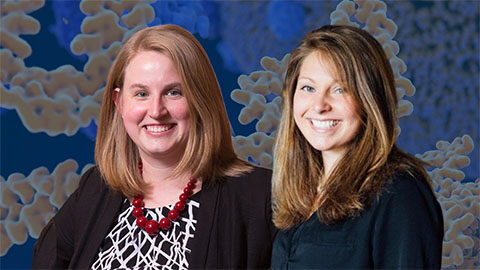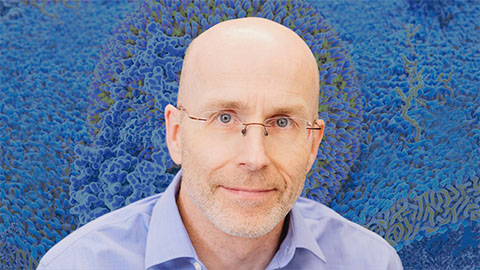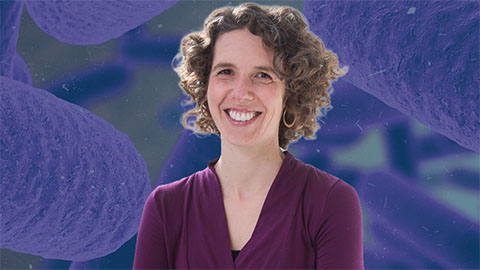Honors for Gordon, Bowman and Benkovic
Gordon wins Princess of Asturias Award
Jeffrey Gordon is one of three researchers awarded Spain’s 2023 Princess of Asturias Award for Scientific and Technical Research. This year’s awardees were selected because they made seminal contributions to science showing that microorganisms are essential for life on Earth. According to the award jury, Gordon was selected for “the discovery and understanding of the human microbiome … (and) enabling innovative therapeutic applications and the search for new effective treatments against antibiotic-resistant bacteria.”

Gordon is a professor in the departments of pathology and immunology, medicine, molecular microbiology and developmental biology, and founding director of the Center for Genome Sciences and Systems Biology at Washington University in St. Louis. His research investigates the role of the gut microbiota in defining healthy growth of infants and children and in the pathogenesis of malnutrition. In addition, Gordon played a leading role in the Human Microbiome Project. His research efforts have led to microbiome-directed therapeutic foods for treating childhood malnutrition.
Gordon is a member of the National Academy of Sciences, American Academy of Arts and Sciences, National Academy of Medicine and American Philosophical Society. He has won numerous awards and honors; recent accolades include the Balzan Prize, the David and Beatrix Hamburg Award for Advances in Biomedical Research and Clinical Medicine, the Dr. Paul Janssen Award for Biomedical Research, and the Albany Medical Center Prize. Gordon is a Thomson Reuters Citation laureate, holds 25 U.S. patents and has been the research mentor to 145 Ph.D. students and postdoctoral fellows.
The 50,000-euro ($53,000) award is one of eight prizes given each year by the Princess of Asturias Foundation. Gordon was honored at a ceremony in October along with biologists Peter Greenberg and Bonnie Bassler and other recipients.
Bowman named AAAS local network liaison
Faith Bowman, a doctoral candidate at the University of Utah, is one of six people named by the American Association for the Advancement of Science to its inaugural class of Local Science Engagement Network liaisons.

The liaisons are building networks in four states and one U.S. territory to mobilize scientists and engineers who are interested in science engagement and policy, according to a AAAS press release. They will engage with local communities to build trust in science and offer scientific evidence to address community concerns and decision-making.
Bowman researches the role of a potential nutrient sensor and its effects on glucose metabolism in diabetes and heart failure in the Summers–Holland lab. She is an Indigenous scholar from the Stockbridge–Munsee Band of Mohican Nation in Wisconsin and a 2023 American Society of Biochemistry and Molecular Biology Advocacy Training Program delegate.
As an LSEN delegate, Bowman is engaging her community in Utah with a goal of recruiting and training scientists and engineers to serve as science advocates and eventually interact with policy stakeholders, including local environmental and health policy–focused organizations. She said she plans to “provide a safe space for budding and established research trainees to explore careers in science and health policy through guided workshops where participants and leadership will be a part of a collaborative network that co-creates opportunities to gain in-field experience and bring science back to the public to increase the public good.”
Over the summer, Bowman and the other liaisons received training from experts on science communication, network leadership and civic engagement before working to develop their networks of scientists in their communities in North Carolina, Maine, Utah, Puerto Rico and West Virginia.
Benkovic awarded honorary professorship
Pennsylvania State University has named Stephen Benkovic an Atherton professor. This title honors retired faculty who hold the Evan Pugh professorship, the University's highest faculty distinction, and wish to continue a high level of engagement as emeritus members.

George Washington Atherton was a Civil War veteran who served as president of Penn State from 1882 to 1906. Evan Pugh, an agricultural chemist, secured Penn State's designation as a land-grant institution and was the university's first president, from 1859 to 1864.
Benkovic is an Evan Pugh professor and Eberly chair in chemistry in the Eberly College of Science at Penn State. He was among the first scientists to hypothesize that conformational changes outside the enzyme’s active site were necessary for achieving maximal catalysis. He is also noted for his studies on the T4 replisome and the discovery of the purinosome in purine biosynthesis. Using state-of-the-art chemical–biological techniques, he has studied many different enzyme systems critical to human biology, contributing fundamental findings to the design of cancer drugs and antibiotics.
Benkovic received the 2009 National Medal of Science from former U.S. President Barack Obama. In 2011, the National Academy of Sciences honored him with its Award in Chemical Sciences. His honors also include the Ralph F. Hirschmann Award in Peptide Chemistry from the American Chemical Society, the Benjamin Franklin Medal in Life Science, the Royal Society Centenary Award, the Merck Award from the ASBMB, the Chemical Pioneer Award from the American Institute of Chemists, the Alfred Bader Award in Bioinorganic or Bioorganic Chemistry from ACS and the Pfizer Enzyme Award.
“Dr. Benkovic is one of the college's most prominent faculty members,” Tracy Langkilde, Eberly College dean, said in a Penn State news article. “He has made extraordinary research contributions at the interface of chemistry and biology, and his innovations have made a tangible impact on society."
Enjoy reading ASBMB Today?
Become a member to receive the print edition four times a year and the digital edition monthly.
Learn moreGet the latest from ASBMB Today
Enter your email address, and we’ll send you a weekly email with recent articles, interviews and more.
Latest in People
People highlights or most popular articles

Creating change in biochemistry education
Pamela Mertz will receive the ASBMB William C. Rose Award for Exemplary Contributions to Education at the ASBMB Annual Meeting, March 7-10 in Washington, D.C.

Amacher, Pollock named Henry Dreyfus scholars
They were recognized for their outstanding research scholarship and a deep commitment to undergraduate education and each received $75,000 to fund their research.

Trainee mentorship as immortality
Suzanne Barbour will receive the ASBMB Sustained Leadership Award at the ASBMB Annual Meeting, March 7-10 in Washington, D.C.

Life in four dimensions: When biology outpaces the brain
Nobel laureate Eric Betzig will discuss his research on information transfer in biology from proteins to organisms at the 2026 ASBMB Annual Meeting.

Fasting, fat and the molecular switches that keep us alive
Nutritional biochemist and JLR AE Sander Kersten has spent decades uncovering how the body adapts to fasting. His discoveries on lipid metabolism and gene regulation reveal how our ancient survival mechanisms may hold keys to modern metabolic health.

McRose awarded Packard fellowship
She will receive $875,000 in research funding over five years.
